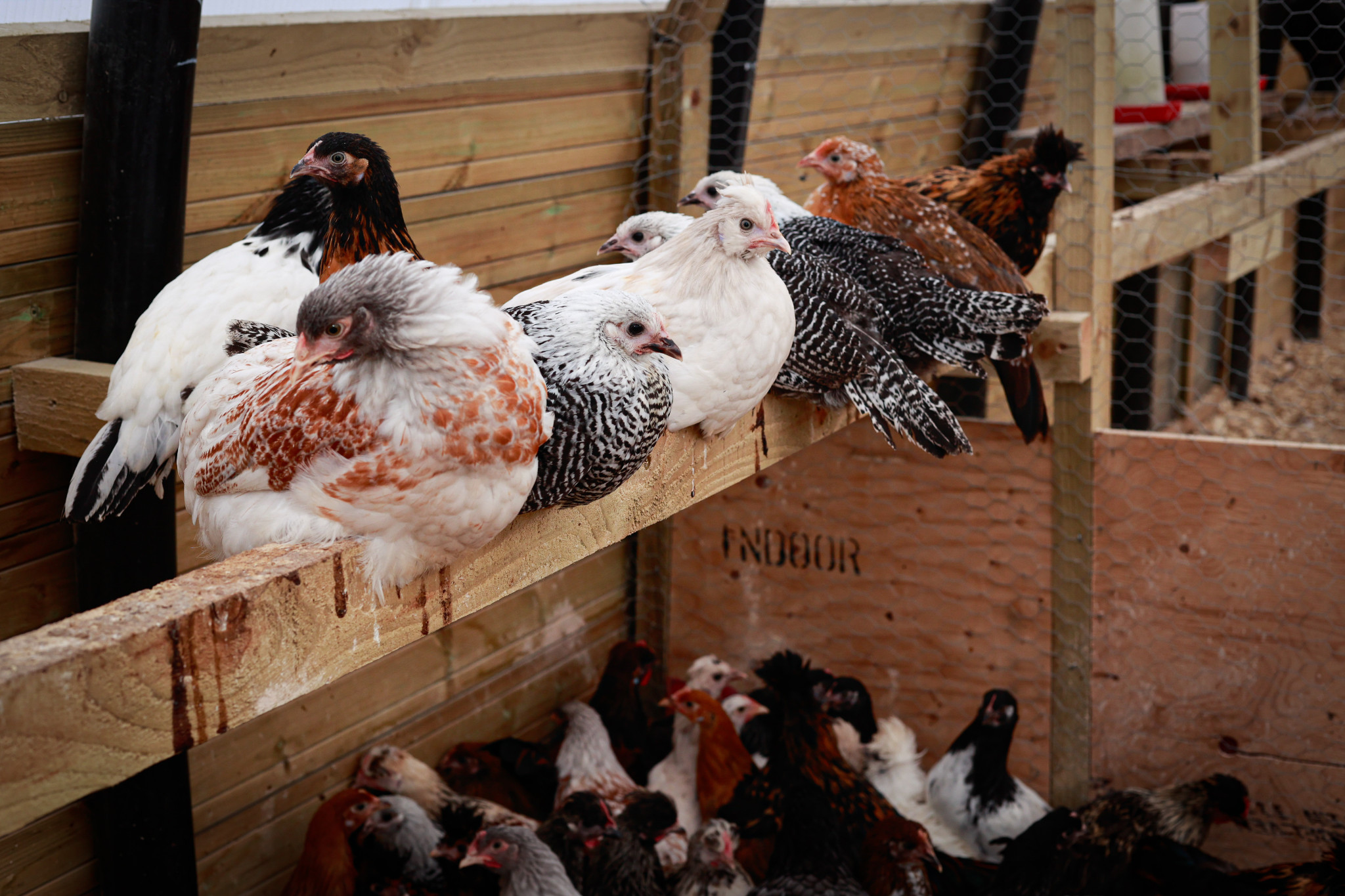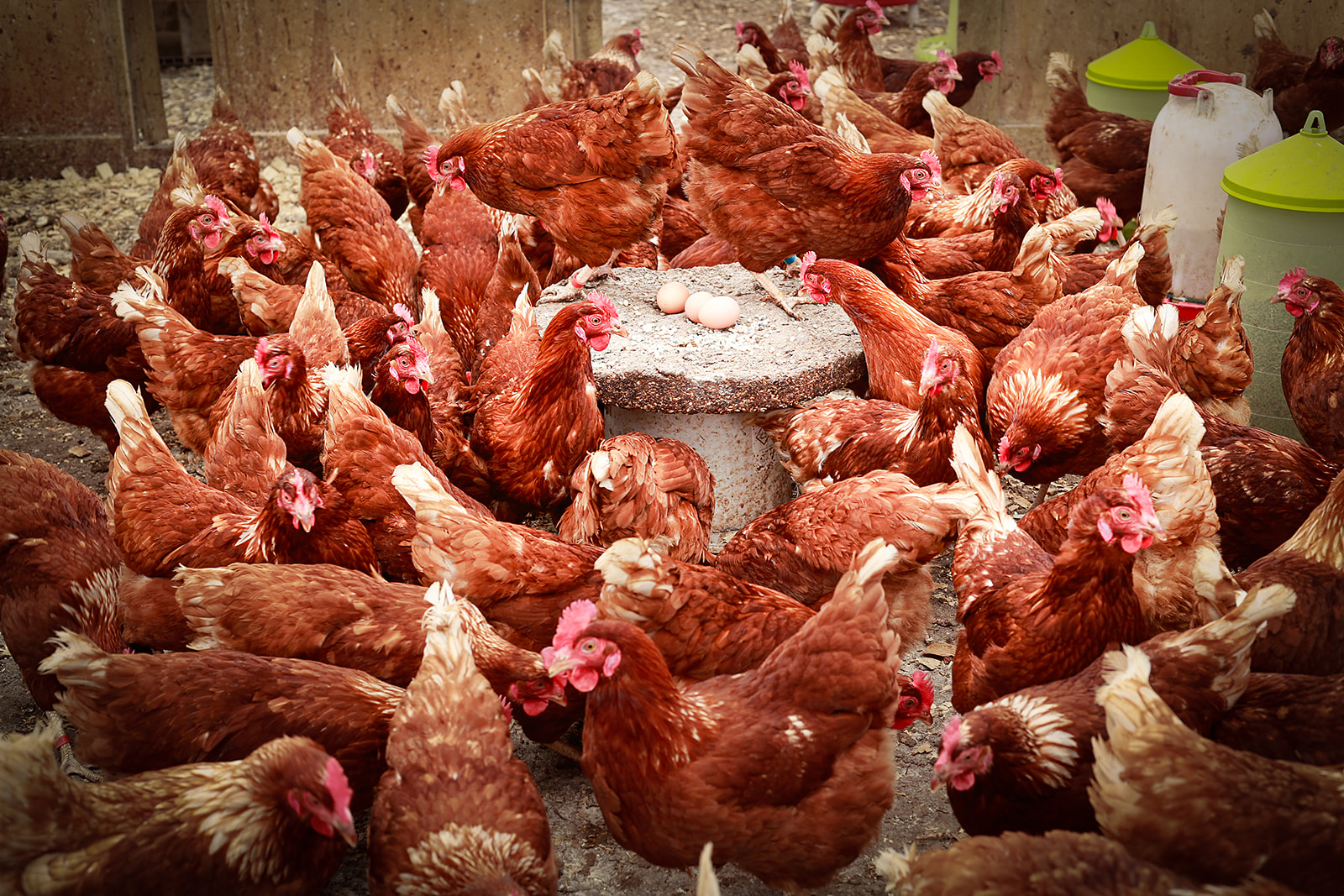While many brands of supermarket eggs have the words “free range” emblazoned on their cartons, it is difficult to imagine many hens having the same true freedom to roam as the happy birds – a dazzling array of colours and breeds – who call Hensington home.
Egg-citing Adventure: Exploring Local Egg Production at Hensington Palace
One of the most immediately striking things when you set foot inside the grounds of Hensington Palace, tucked away in a secluded pocket of Shetland’s north mainland, is the almost domesticated nature of the dozens of hens that flock to the gate to forage and peck around at the toes of their visitors.
The seeds of what would become this enterprise were sown when, following the death of his father a few years ago, Leslie Anderson inherited seven old hens. Initially he kept them in a small red hen house on their croft at Sullom, before deciding to upscale.
For several years before selling up in 2022, Leslie and his partner Robert Webster ran the Drumquin Guest House in Brae.
It included a small-scale dining room where they served up very highly regarded breakfasts and dinners. After realising they were “using a braw lot” of other suppliers’ free range eggs in their cooking, the couple decided to “kill two birds with one stone and get our own”.
The number grew, first from seven to 30, then from 30 to 50, and before long the operation relocated to a larger shed on a piece of largely unused land at Briarlea Croft, Sullom.
When it came to increasing the feathered stock beyond 50, they spoke to Leslie’s sister Maree Hay of the groundbreaking Northmavine Community Development Company (NCDC) charity. They jointly came up with the idea of using NCDC’s innovative polycrubs to create the optimal environment for housing hens.
The Polycrub concept is similar to that of polytunnels, but the sturdy structures are designed to withstand Shetland’s strong winds and boast a green ethos not only in encouraging folk to grow produce locally, but also in utilising waste equipment from the aquaculture industry.
Leslie said that when Hensington’s first polycrubs – they now have six – were built it instantly became “amazing success”.
“It’s such a versatile building that we could adapt it to the use of the hens,” he explains, “and the hens laid really well in it because they were getting the first blink of daylight in the morning and the last blink of daylight at night, whereas our previous wooden sheds were dark for long periods of the day.”
Working with Maree, they settled on the “completely new” idea of fixing white sheets to the polycrubs’ frames, reducing the heat inside the structures by around 50 per cent and adapting the produce-growing concept into a design suited to keeping animals.
Maree says quite a few folk use them for hens, lambs and as sheds, both in Shetland and farther afield. Lewis crofter Domnhall ‘Sweeny’ McSween, of BBC Alba’s ‘The Croft’ fame, is among those to have cottoned onto the idea, building a polycrub to keep his sheep safe from the threat of crows and ravens.
Alongside the polycrubs, Hensington boasts various smaller structures and now accommodates some 350 laying hens, which produce their free range eggs, along with 100 pure breeds, 60 cockerels and 250 baby chickens.
Robert explains that expanding any further would take the business over the threshold for the next level of regulatory requirements, including “more input from vets and testing that we couldn’t sustain, which is such a shame because the demand is there”.
However, as things stand they are able to produce enough eggs to supply shops and schools in the north and west mainland, as well as eateries including Busta House Hotel and the Peerie Shop Café in Lerwick.
Their laudable business ethics extend to “working alongside other free range suppliers to be careful not to step on other folk’s toes”, Leslie says, and in terms of outlets they do supply “the majority have approached us – the product has effectively sold itself.
When Taste of Shetland visits on a cool, overcast late July afternoon, two things stand out straight away: the genuine warmth and passion Leslie and Robert have for their vocation, and the contentedness of the curious creatures they keep.
The setup would hold its own anywhere in the world as a beacon of ethical and responsible food production – chiefly thanks to their twin commitment to animal welfare and the delivery of a premium, high quality product.
Herbs and kale are grown specifically for the hens’ consumption and they are fed a lot of greenery too, while the birds “gather a lot of minerals from the earth” and enjoy peace and seclusion in a part of the world where “there’s not a lot of passing traffic”.
“The hens are much happier, they lay well, and they keep good health,” Leslie says. “The feedback we get from folk is that the eggs taste really good. It’s not just the fact it’s an egg. It’s big, t’s got an orange yolk, customers say they taste really nice – they taste different from a supermarket egg.”
It is a relentless operation that relies on seven days a week of hard work, in between holding down day jobs.
As well as feeding and keeping the hens’ living quarters clean, there’s “a lot that goes on behind the scenes – packing, labelling, recording, candling eggs before sale, and then the delivery too – we do it all ourselves”, Leslie says.
Their accountant occasionally asks “what are you doing this for?”, they joke, and Robert is realistic that the past few years have required significant investment. But “we would hope in five or six years’ time to be able to get something back”.
The old adage goes that, if you have a box of eggs, you have the makings of a meal. So do Robert and Leslie have a favourite use for the oval-shaped produce they invest so much labour and love in?
“You cannot beat a simple cheese-and-onion quiche,” Robert says, and Leslie chips in: “Scrambled eggs, too. They need very little enhancement to make a very simple but filling dish.”
They may have maxed out their practicable production capacity for now, but the pair are always looking at ways of developing the business.
Leslie says they have “only tested the market lightly” but from conversations they detect a “keenness up here to be able to get hens, and different breeds, locally”, which would also eliminate the need to put imported birds through the stress of a 12 or 14-hour boat journey.
They are also keen to play their part in preserving the Shetland hen, a breed that is “dying out – it’s only the older generation that’s keeping them now”.
“The fashion is to bring up hybrid hens, because they lay a lot of eggs, but this animal was created 100 years ago and has lived here specific just to Shetland,” Robert, originally from St. Andrews, says.
Noting the successful example of Chris Dyer’s Garth’s Croft in Bressay, Leslie has identified scope for developing agritourism and possibly school visits – present concerns about bird flu notwithstanding – as well as furthering an already fruitful relationship with NCDC.
Robert adds: “We’re very proud of what we’ve achieved here. It’s a major achievement to have all these different breeds, and to be able to offer that to the public. And there’s still plenty of scope for development.”
For a delicious egg dish, why not try Kirsten Williamson's Cheese Soufflé. Click here for the recipe
Photography by May Graham










